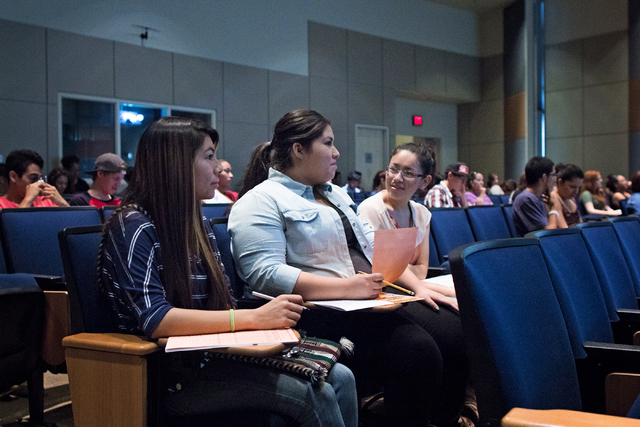CSN strives to retain students
The College of Southern Nevada spent a year crunching numbers and holding focus groups on how to improve student retention.
The purpose: identifying what makes the difference between successful students and dropouts.
So the college went to students who were sticking it out and asked what helped them stay committed.
The answer was surprising: It wasn’t the college — it was luck.
Laura Latimer, assistant vice president for community engagement services, said the college conducted focus groups and students told researchers that by happenstance they had found someone — a dedicated professor, a college-savvy friend — to help them navigate college life. That’s a need students said the school doesn’t fill.
Latimer called the revelation invaluable because CSN had been assuming students knew what to do to succeed.
When Latimer started at CSN about 12 years ago, the approach was more, “Hope you find the classes you need to take and I’m here if you need me.”
That’s changing.
CSN is experimenting with restructuring the requirements for new students based on the college’s research.
The catalyst for CSN’s probe into student success was being accepted into the education nonprofit Lumina Foundation’s Achieving the Dream initiative in 2012. Achieving the Dream is a network of more than 200 community colleges. The nonprofit works with its colleges by providing resources to help them increase student achievement.
Becoming an Achieving the Dream institution put CSN on a three-year plan. Year one: Collect data. Year two: Develop a strategy based on that data.
Enter year three: Testing that strategy.
The proposed changes sound simple, but administrators predict they will make a big difference.
This school year, Clark County School District graduates will have to go through an in-person or online orientation, meet with an adviser and take the math and English placement tests before they can enroll. Students also will be required to enroll in math and English classes in their first year. Previously, those things were optional.
If the mandate goes well for the roughly 4,000 CCSD graduates expected to enroll for 2014-15, CSN will apply the requirements to all students in 2015-16, said James McCoy, associate vice president for academic success.
“It’s just human nature we just don’t do things unless there is something in it for us,” said William Neff, leader of the Achieving the Dream Initiative at CSN and a professor in the communication department. “The goal is to help students be successful. If they’re not successful, then we aren’t doing our jobs.”
It’s also a bit of tough love to save students from higher-education heartache down the line, Latimer said. The college found that some students were putting off placement tests and finding out later that they must take remedial math classes, setting their degree goal back by multiple semesters.
“That’s a punch in the gut,” Latimer said.
Placement test results can be demoralizing, she said. For students who thought they were about to graduate, poor test scores can make it seem like the light at the end of the tunnel has been snuffed out. Some students decide they already have mastered the technical aspects of their field so pursuing the degree is pointless, and that’s a mistake, Latimer said.
CSN expects eliminating placement test procrastination and requiring students to dive into math and English classes from the get-go will improve retention and, ultimately, graduation rates, Neff said.
The graduation rate for the 12.1 percent of CSN students who took math in their first year was 19.3 percent, according to the 2013-14 Remedial Placement and Enrollment Report presented July 15 to the Legislative Committee on Education by the Nevada System of Higher Education. The 87.9 percent who did not take the course in the first year only had a 5.5 percent graduation rate, according to the report.
As part of the change, recent CCSD graduates also will be matched with a faculty adviser, whom they can chat with about goals, internships and other opportunities, McCoy said.
In 2007, the communication department had several full-time professors devote about five to 10 hours a week to advising, and, in a three-year period, the department saw a 300 percent increase in its graduation rate, said McCoy, who served as the communication department chair during that period.
The college picked recent CCSD graduates as guinea pigs, McCoy said, because the group was easy to track and was new to higher education, giving them little educational baggage, such as complicated transfer credits.
If this third initiative year goes well, McCoy said, the college then will be able to apply for different grants through Achieving the Dream. That would give the school funds to increase advising for all students.
Lester Tanaka, an English professor who teaches a CSN success and life skills class, said he thinks the new requirements are a great idea. The trick will be capturing students’ attention and making them realize success is important, he said. Students can be required to do something, he said, but that doesn’t mean they will be attentive.
“We have to sell (college success),” Tanaka said. “It’s important that students feel connected.”
Contact Bethany Barnes at bbarnes@reviewjournal.com or 702-477-3861. Follow @betsbarnes on Twitter.


























